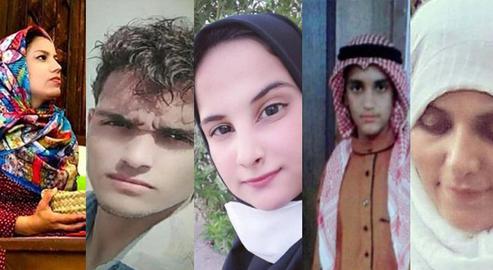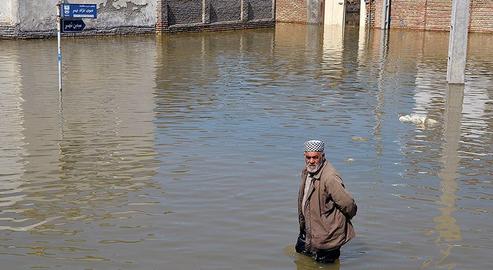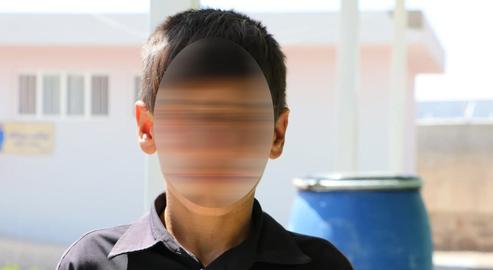During the past week, several Iranians active in cultural affairs, women's and children's rights, and voluntary social activities, were arrested in various cities of Khuzestan province and transferred to unknown locations. Fatemeh Tamimi, Maryam Ameri, Azhar Alboghbish and her two brothers, Reza and Abbas, Zeinab Savari, her brother Hamzeh and her niece Fatemeh, were among those arrested. All the detainees were involved in organizing aid for the flood-stricken people of Khuzestan in 2018. All of them were involved in recording the oral history of the Arab people of Khuzestan and have had no other social or political activities.
An informed source told IranWire that the detainees had been pressured by security forces to confess against themselves.
"Fatemeh's family has been told that there is no security or political charge – and to not make a fuss and or inform foreign media. These people are charged with money laundering and financial crimes, and are due to be released on bail by December 19. But the pressure is such that they seem to be asking the detainees to admit that they accepted money from foreign governments and are trying to force them to confess against themselves."
This statement was made by a friend of Fatemeh Tamimi, a 39-year-old woman from the city of Chamran, in the port of Mahshahr, who was arrested at her home on December 9, 2020. In addition to her, several other Arab men and women working in cultural affairs and the rights of women and children in Khuzestan have been arrested and transferred to unknown locations.
Fatemeh Tamimi was involved in recording the customs and traditions of the Arab people in Iran’s Khuzestan province. Tamimi travelled from city to city and village to village to record the texts of ancient tales, lullabies and Arab folklore, and to document the oral history of the people of this region.
"When they broke into the house to arrest Fatima, no one was at home except her and her two children," said an informed source who spoke to IranWire. "Fatemeh was violently detained in front of two children, and I could not sleep for several days when I think about what they saw."
Maryam Ameri, a citizen of Ahvaz and a friend and colleague of Fatemeh, was arrested by intelligence agents in Ahvaz on Wednesday evening, shortly after Fatemeh.
"Maryam is a close friend of Fatemeh Tamimi. They used to collect stories, lullabies and songs in Arabic together, from village to village, to record the oral history," of the Arab people in Khuzestan, said a source interviewed by IranWire. "In the flood of 2018 in Khuzestan, where the villages around Ahvaz, Abadan, and Mahshahr were in dire need of food for several consecutive days and the flood had cut off their connections to the cities, Maryam and Fatemeh worked very hard. They were up to their necks in the water, reaching out to help by any means possible. Now they are being accused of these strange things."
The source said that the arrest of Maryam Ameri has worried her family: "Maryam's uncle had a stroke upon hearing the news of her arrest. Thank God his general condition is good, but the extent of their concern for Maryam is unimaginable."
According to this informed source, after the arrest of Maryam Ameri and Fatemeh Tamimi, their families said: "Now the families know that Maryam and Fatemeh are in the detention center of the Ahwaz Intelligence Office, but they are not the only ones who have been arrested. Three teenagers under the age of 20, all from the same family, and a teacher from Dasht-e Azadegan, along with his younger brother and sister, were also arrested. Four other citizens were also arrested in Mahshahr; but we are still unaware of their identities, charges, and whereabouts. The situation is very worrying because none of these people have contacted their families and their whereabouts are unknown."
The source referred to the arrests of a young woman named Azhar Alboghbish and her two brothers, Reza and Abbas Alboghbish. All three are under the age of 20 and have been detained by Revolutionary Guards intelligence in Shadegan.
A teacher living in Dasht-e Azadegan, Zeinab Savari, is also among the detainees. Savari, along with her brother, Hamzeh Savari, and her niece, Fatemeh, were detained by security forces on December 11.
In the record all detainees, there is no activity other than voluntary relief activities and organizing aid to the flood-stricken people of Khuzestan in 2018 and recording the oral history of the Arab people in the province.
An informed source who spoke to IranWire said: "Most of the activities of these friends have been charitable, voluntary and for the growth and excellence of the indigenous people of Khuzestan province. The pressure on these families by security agencies is a clear violation of human rights. There is no evidence to support the allegations. No verdict has been issued and no contact will be answered. The families intend to go to the Revolutionary Court of Ahvaz to find out the fate of their children and to wait until they receive information of their loved ones."
This is not the first time that Arab cultural activists in Khuzestan have faced security charges. The pro-government media in Iran often targets ethnic minorities, especially Arabs, as soon as they are arrested. Most media outlets close to the security services describe the detainees as "separatists" and say that they are seeking an independent identity to encourage the region to secede from Iran.
Haifa al-Asadi, an Arab rights activist in Iran, believes that their activities, regardless of their orientation or purpose, are ultimately considered as security risks by the regime because there is a systematic and prejudiced view when it comes to ethnic minorities.
"In the eyes of the people, the activities of Arab women detainees and many other activists in this region are public, charitable, cultural or social activities. But because the government has a security view of ethnic minorities, any activity, even the smallest social movement, is considered as a political action, and any activity that leads to awareness, influence and demands [for fair treatment from the authorities] is not tolerated and leads to arrests, torture, threats and other pressures on detainees and their families,” al-Asadi said.
Fatemeh Tamimi, who was arrested in the city of Chamran in Mahshahr, had been working as a journalist for many years. She is a documentary filmmaker who has reviewed works of Arab folklore, written poems and stories for children, and recorded Arabic lullabies.
"If Fatemeh had not been an Arab and lived in another city, such as Isfahan, the news of the arrest of a local journalist would have spread quickly in the media," said Haifa al-Asadi. "But the security view on ethnic minority groups is so strong that it even affects the publication of news and information about them and the factual record of what they do. You can see how many statements and campaigns have been launched for the detained non-Arab writers. But when Abbas Savaedi, a novelist and poet, was arrested in Ahvaz, officers broke the hand of his elderly grandmother. No statement or support was forthcoming from his colleagues."
These are the methods of a centralist system and structure, al-Asadi said. "The centralist system means a system that is, deliberately and sometimes subconsciously, suppressing the voices that are distinct from or not in favor of majority. Many [centralists] think that if they listen to the voice of one of the minorities, such as the Arabs, and make their voices heard, it will empower them, and this is worrying for the government. Discrimination against Arabs in Iran, therefore, has heavy costs for both the media and those who deal with it independently."
Sepideh Gholian is an example of a non-Arab who wrote about the suffering and discrimination of women prisoners in Sepidar Prison. In a book entitled “Tilapila Drains the Blood of Hour al-Azim,” in 19 stories, Gholian presented an accurate yet bitter picture of the captivity experienced by Arab Iranians in Ahvaz Intelligence Detention Center and Sepidar Prison. In these stories, in addition to showing the face of repression, Gholian narrated the fate of people that are denied and left in oblivion.
Haifa al-Asadi, referring to the way different traditions, values and culture have been discarded in Iran by the regime, said: "The preservation of the mother tongue, preservation of culture and the equality of the ethnicities that live together in one area, is something that has been withheld from us over the years. This right has been denied in various forms by the ruling regime in Iran, and now it is impossible for them to tolerate the revival of these values by people who love their traditions and ancestral culture and rituals. Therefore they try, in any way they can, to stop all the activities that they had tolerated until today, by limiting the freedoms of these people. They increase the cost of protesting against it, for you and me, and thus continue to exploit the citizens."
He pointed to the need for unity among the different ethnicities in Iran, and said: "We, as egalitarian activists, should try to use equal words for the citizens. Calling their language a local language is a strategic mistake, as if everything that is Persian is the origin and the rest is a subculture. This view is destructive, even if used subconsciously. If we are to be the voice of the Arabs, we should be acknowledge the discrimination and oppression imposed on them, but not with the language of a regime who accuses them without cause."
visit the accountability section
In this section of Iran Wire, you can contact the officials and launch your campaign for various problems


























comments